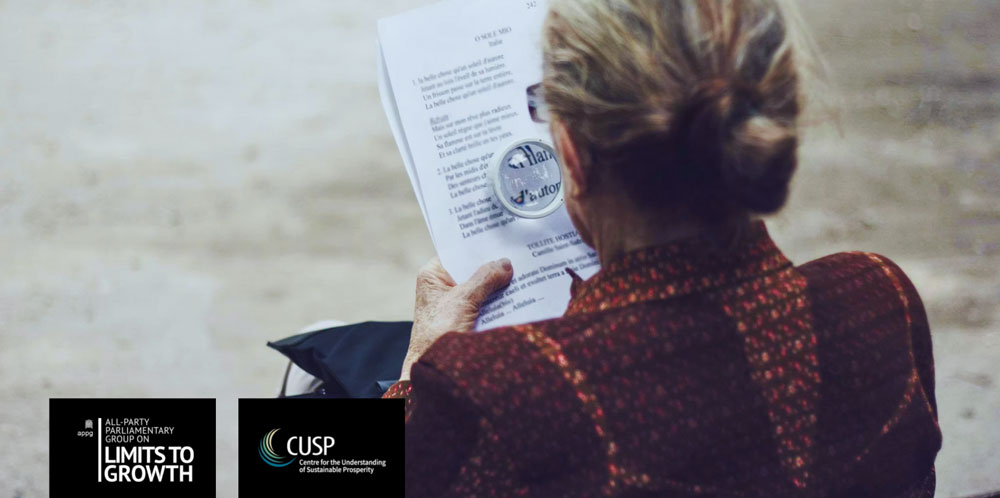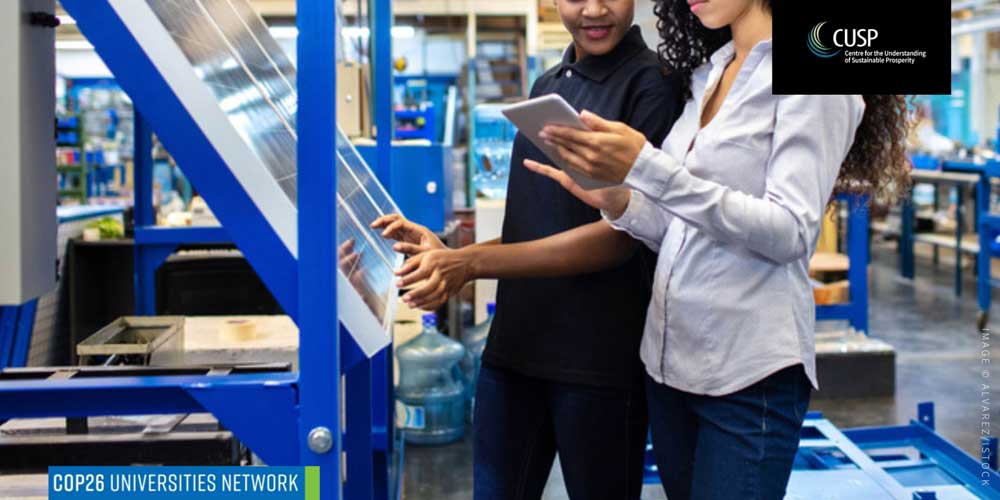PUBLICATIONS
As our work progresses, publications are arising from our research themes and cross-cutting projects. We produce working papers, journal articles, evidence submissions to government enquiries, essays, books and book chapters. Subscribe to our newsletter to receive a monthly digest in your inbox. If you want to hear more frequently from us, you can subscribe to email updates from the website directly.

This Aldersgate Group report with CUSP calls on the UK Government to provide a strong legal basis for financial regulators to support the transition to a net zero and nature positive economy. It finds that financial regulators are limited by a narrow mandate on climate, capacity and resource constraints, and a lack of comprehensive net zero-aligned policy across the economy.

This Aldersgate Group report with CUSP calls for rapid action to implement and strengthen the UK Government’s proposed reforms on climate reporting and disclosure. The briefing also outlines the next steps that must be taken to support corporations and financial institutions to comply cost-effectively with these new requirements, and ensure that new reforms help deliver genuine emission reductions in the real economy.

Through a series of in-depth interviews with care workers Christine Corlet Walker et al explore the impact of investment firms on working conditions and quality of care in UK care homes. Combined with an analysis of care company accounts generating insights into the impacts of financialisation on the UK care sector, the report shows how investment firms are using extreme strategies to reduce staffing levels and cut costs in the name of profit, with appalling consequences for care.

In the years since the financial crisis, a heated debate has broken out amongst macroeconomists about the appropriate roles of fiscal and monetary policy in managing public sector debt. This working paper and accompanying policy briefing introduce the main lines of argument on both sides of the controversy. We find i.a. that a return to fiscal austerity would be both dangerous and unjustified and that moving beyond ideology is key to the levelling-up agenda.

Ahead of hearings planned for 9 February 2022, the UK Environmental Audit Committee invited written submissions to examine how the UK Government could incorporate environmental sustainability into its leading measures of UK economic success, addressing questions around ‘inclusive wealth’, measurement of national wellbeing, and national government accounting.

The Health and Care Bill has its second reading in the House of Lords on Tuesday 7 December. Coinciding with a new Panorama investigation, Crisis in Care: Follow the Money, this briefing proposes three ways in which the Health and Care Bill should be amended to tackle the harmful impacts of financialisation in the care home sector.

This paper is an update of an earlier briefing note, revised to take account of new findings from the IPCC’s updated 6th Assessment Report (AR6). The broad aim of the paper is to establish how soon the UK should aim for (net) zero carbon emissions.

In this new report, the Aldersgate Group and CUSP urge the Government to use the UK’s current leadership position on climate change and the environment, and its ongoing review of financial services regulations, to embed environmental sustainability into the rules governing the UK’s financial system and influence similar changes to international rules and standards.

A new joined-up post-Covid biodiversity policy paper argues that addressing biodiversity loss requires a transformative change of the global economic system, and concludes that the COVID‐19 pandemic, and current delays in the negotiation of the post‐2020 global biodiversity agenda of the Convention on Biological Diversity heighten the urgency to build back better for biodiversity, sustainability, and well‐being.

Skills deficit needs to be urgently tackled to get to net zero. In its briefing with CUSP, Upskilling the UK workforce for the 21st century, the Aldersgate Group calls for urgent action to plug the deficit in skills that currently undermines the growth of low carbon supply chains across the UK economy.

Following extensive cross-industry and civil society engagement, our partners at the Aldersgate Group published a new report, setting out some of the key policy decisions that need to be taken in this parliamentary term to put the UK on a credible pathway to building a competitive, net zero emissions economy.

The transition to net-zero cannot be sustainable if it creates or exacerbates social inequalities. In a new COP26-Universities-Network briefing, the authors—including CUSP co-investigator Dr Marit Hammond—emphasise that the impacts of climate change and the policy measures implemented to mitigate them, vary greatly depending on place, time and social contexts; and identify a number of tools for policymakers to meet targets whilst also upholding social justice.

In early Spring this year, written submissions were invited to aid the Committee in prioritising its future programme of work. CUSP director Tim Jackson submitted evidence, making the case for necessary innovations in governance and a realistic and responsible approach to the management of the economy: Sustainable Development Goals and the 2050 Vision for Biodiversity cannot be achieved without transformative change, the conditions for which have to be put in place now.

This policy briefing highlights some alternatives to the conventional approach to measuring social progress. It presents a three-fold strategy for moving beyond GDP by: changing the way we measure success; building a consistent policy framework for a ‘wellbeing economy’; and addressing the ‘growth dependency’ of the economy.

There is growing awareness that business and investor plans need to better address the growing physical and regulatory risks arising from climate change and climate policy. This policy briefing is discussing how businesses and investors can improve their understanding of these risks and ensure this results in better informed decision making.

Earlier in 2019, the UK Treasury Select Committee launched an inquiry into the decarbonisation of the UK economy and green finance, set out to scrutinise the role of the Treasury department, regulators and financial services firms in supporting the UK Government’s climate change commitments. Drawing on recent CUSP reports, Tim Jackson, Aled Jones and the Aldersgate Group submitted evidence.

This briefing paper summarises the dilemma associated with using mainstream, macroeconomic models to guide disruptive, transformative change such as those that might occur under ‘deep decarbonisation’: a rapid transition to a net-zero carbon economy. Some form of macro-economic modelling framework is essential to enable policy-makers to exercise short- and long-term fiscal responsibility. Incremental models based on historical behaviour, however, are a poor guide to outcomes under circumstances of disruptive change.

CUSP briefing addressing the question of when the UK should aim for zero carbon emissions. In it, Prof Tim Jackson is making the case for a (fair) zero carbon target of 2030, calling for a policy strategy not only on zero carbon targets, but emission pathways, with a defined level of negative emission technologies. It is notable that reduction rates high enough both to lead to zero carbon (on a consumption basis) by 2050 and to remain within the carbon budget require absolute reductions of more than 95% of carbon emissions as early as 2030.

The second in our series of briefing papers on building An Economy That Works explores inequality in the UK. It examines the evidence for rising inequality over the last fifty years, estimates the economic welfare lost to society from an unequal distribution of incomes and addresses the critical question of managing inequality in the context of declining growth rates.

This first in our series of briefing papers on building An Economy That Works explores the underlying phenomenon of ‘secular stagnation’ – a long-term decline in the rate of growth of the Gross Domestic Product (GDP). The paper examines the evidence, explores the causes and discusses the implications of what some now call the ‘new normal’.

Strategic government intervention can maximise opportunities for private green infrastructure investment, our ‘Investing in the Future’ project report with the Aldersgate Group finds, setting out a full list of recommendations for government and industry.

On 16 January 2018, CUSP research fellow Alex White gave evidence to the Environmental Audit Committee on their green finance inquiry. Based on our research with the Aldersgate Group, Alex White argued for the need to create an attractive low carbon investment environment in the UK if we are to see the real benefits of a growing green finance industry.

In October 2016, the National Infrastructure Commission has launched a 15 week call for evidence to provide input into the development of its National Infrastructure Assessment. The Centre for the Understanding of Sustainable Prosperity responded.

On 26 May 2016, the National Infrastructure Commission published a consultation on the process and methodology for putting together the UK’s first National Infrastructure Assessment. CUSP responded.

In July 2016, the House of Commons Environmental Audit Committee has launched an inquiry into domestic implementation of the UN Sustainable Development Goals (SDGs) to which the Centre for the Understanding of Sustainable Prosperity responded.

A recent consultation by HM Treasury has invited written feedback on the proposed governance, structure and operation of the new National Infrastructure Commission; CUSP submitted a reply.

The Environmental Audit Committee has invited written evidence on the role of HM Treasury in relation to sustainable development and environmental protection, CUSP submitted a response.
